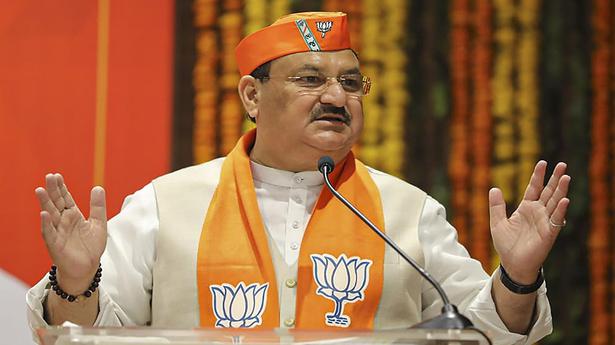
Centre included 503 projects in Andhra Pradesh in the National Infrastructure Pipeline, claims BJP
The Hindu
The BJP said the State’s expenditure crossed the limits since 2014-15
The BJP claimed that 503 projects in Andhra Pradesh have been included by the Central government in the National Infrastructure Pipeline with a total capital outlay of ₹8,16,583 crore for 2020-25 period. These projects are to be taken up by various Central departments or the State on EPC basis.
It was also mentioned in a booklet released by BJP national president J. P. Nadda at a meeting of the chiefs of Shakti Kendras in Vijayawada on June 6 that the Centre is ready to set up an integrated steel plant in Kadapa district in tune with its commitment to the development of Rayalaseema.
An expert committee constituted by the Steel Authority of India Limited found that the locations identified for setting up the steel plant were not suitable but a task-force formed in its wake found some favourable conditions. Accordingly, the Centre is prepared to establish the steel plant.
The Centre alleged that the State government has not come up with an alternative location for the construction of a seaport after the proposed Dugarajapatnam port was declared unviable. Several railway projects fizzled out due to the non-payment of the State’s share of the total estimated cost of ₹15,847 crore.
That special financial assistance has been sanctioned in lieu of Special Category Status (SCS), for which the 14th Finance Commission made no distinction between the States, but the State has so far not formed a special purpose vehicle to avail the package, was reiterated.
It was also stressed that SCS has nothing to do with the industrial incentives.
As far as the capital is concerned, the BJP said the Centre had given ₹2,500 crore but the YSR Congress government made a mess of it by coming up with the impractical idea of three capitals whereas N. Chandrababu Naidu left it unfinished.

“Writing, in general, is a very solitary process,” says Yauvanika Chopra, Associate Director at The New India Foundation (NIF), which, earlier this year, announced the 12th edition of its NIF Book Fellowships for research and scholarship about Indian history after Independence. While authors, in general, are built for it, it can still get very lonely, says Chopra, pointing out that the fellowship’s community support is as valuable as the monetary benefits it offers. “There is a solid community of NIF fellows, trustees, language experts, jury members, all of whom are incredibly competent,” she says. “They really help make authors feel supported from manuscript to publication, so you never feel like you’re struggling through isolation.”

Several principals of government and private schools in Delhi on Tuesday said the Directorate of Education (DoE) circular from a day earlier, directing schools to conduct classes in ‘hybrid’ mode, had caused confusion regarding day-to-day operations as they did not know how many students would return to school from Wednesday and how would teachers instruct in two modes — online and in person — at once. The DoE circular on Monday had also stated that the option to “exercise online mode of education, wherever available, shall vest with the students and their guardians”. Several schoolteachers also expressed confusion regarding the DoE order. A government schoolteacher said he was unsure of how to cope with the resumption of physical classes, given that the order directing government offices to ensure that 50% of the employees work from home is still in place. On Monday, the Commission for Air Quality Management in the National Capital Region and Adjoining Areas (CAQM) had, on the orders of the Supreme Court, directed schools in Delhi-NCR to shift classes to the hybrid mode, following which the DoE had issued the circular. The court had urged the Centre’s pollution watchdog to consider restarting physical classes due to many students missing out on the mid-day meals and lacking the necessary means to attend classes online. The CAQM had, on November 20, asked schools in Delhi-NCR to shift to the online mode of teaching.









